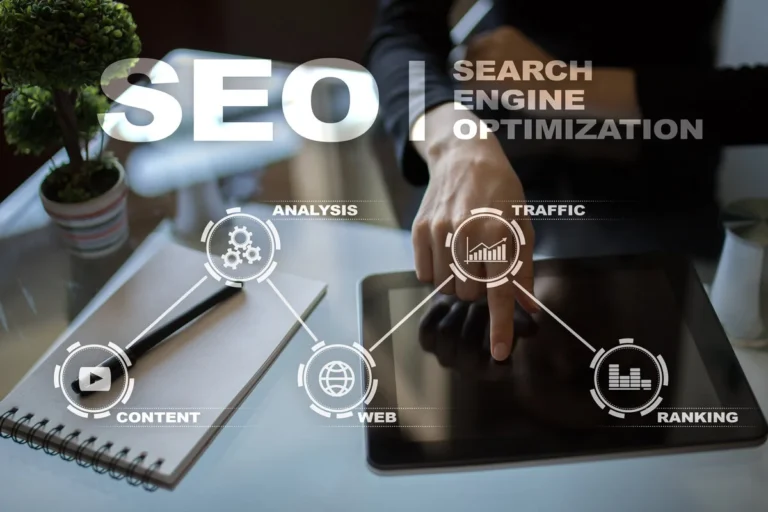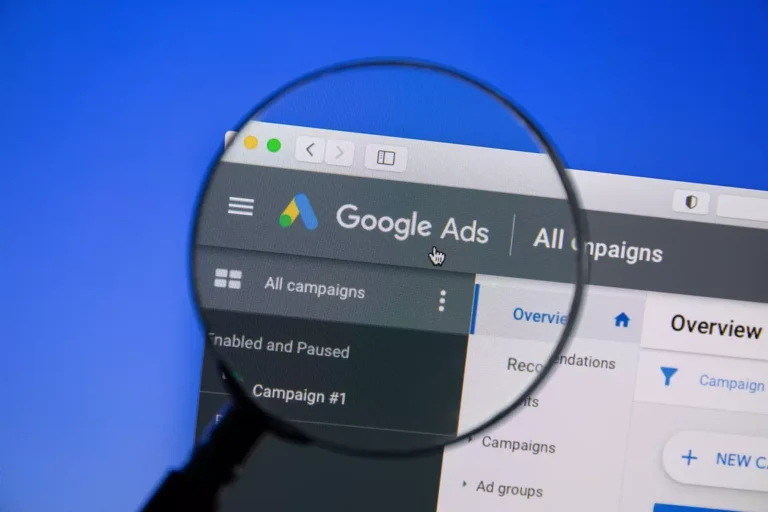B2B SEO helps your business show up when other companies search for the products or services you offer. Unlike regular SEO that targets individual customers, B2B SEO focuses on reaching business decision-makers who have different needs and longer buying processes. Getting this right can bring qualified leads to your business and establish you as an industry expert. To take your strategy further, consider partnering with professionals who offer SEO Optimization Services.
What Makes B2B SEO Different?
B2B SEO targets businesses instead of individual consumers, which changes everything about how you approach search optimization. Business buyers take longer to make decisions, often involve multiple people in the process, and need detailed information before they buy.
Why B2B SEO Matters for Your Business
When done right, B2B SEO helps potential customers find you when they’re actively looking for solutions. This means higher quality leads because these people already have a business need you can solve.
B2B SEO also builds trust and authority in your industry. When your company consistently appears in search results for relevant topics, other businesses see you as a knowledgeable leader worth working with.
How B2B Differs from B2C SEO
B2C SEO often focuses on quick decisions and emotional appeals. B2B SEO needs to address practical business concerns like return on investment, implementation challenges, and long-term value.
Business buyers also search differently. They use industry-specific terms, look for detailed specifications, and want proof that your solution works through case studies and testimonials.
How Do You Create a Winning B2B SEO Strategy?
A successful B2B SEO strategy starts with understanding your audience and builds from there. You need clear goals, the right keywords, and both technical optimization and great content.
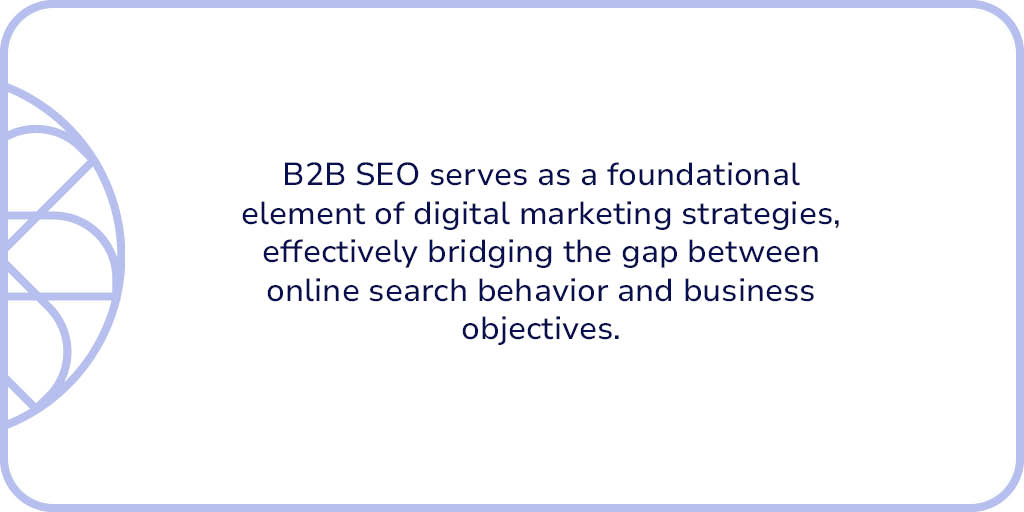
Understanding Your Target Audience
Start by creating detailed profiles of your ideal business customers. What challenges do they face? What information do they need to make decisions? Who else is involved in their buying process?
Talk to your current customers to understand how they found you and what convinced them to buy. This real-world insight helps you create content that resonates with similar prospects.
Setting Clear Goals
Your B2B SEO goals should be specific and measurable. Instead of just wanting “more traffic,” aim for goals like “increase qualified leads by 30% in six months” or “rank in the top 3 results for our main service keywords.”
Clear goals help you focus your efforts and measure whether your strategy is working. They also help you explain the value of SEO to other people in your company.
Keyword Research for B2B
B2B keyword research goes deeper than consumer keywords. You need to find the specific terms your target customers use when they’re looking for solutions like yours.
Focus on keywords that show business intent, like “enterprise software solutions” or “B2B marketing automation.” Long-tail keywords work especially well because they’re more specific and face less competition.
Use tools like Google Keyword Planner, SEMrush, or Ahrefs to find keywords your competitors rank for and identify gaps you can fill.
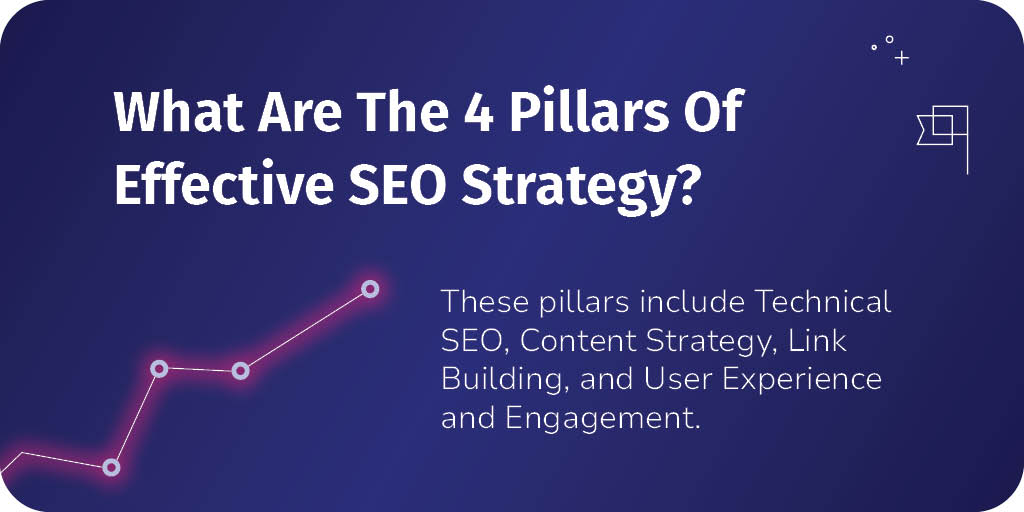
Content Mapping
Once you have your keywords, map them to different stages of the buying process. Early-stage prospects might search for “what is marketing automation,” while later-stage buyers look for “marketing automation ROI calculator.”
Create content that matches where people are in their journey. Educational blog posts work for the early stages, while detailed case studies and comparison guides help people who are ready to buy.
On-Page and Off-Page Optimization
On-page optimization means making sure each page on your website is properly set up for search engines. This includes using keywords naturally in your titles and content, optimizing page speed, and making sure your site works well on mobile devices.
Off-page optimization focuses on building your website’s authority through high-quality brand mentions and backlinks from other reputable sources. In B2B, this often means getting featured in industry publications and product reviews.
What Are the Four Pillars of Effective SEO?
Successful B2B SEO rests on four main pillars that work together to improve your search rankings and bring in more qualified leads.
Technical SEO
Technical SEO ensures search engines can easily find, crawl, and understand your website. This includes having a clear site structure, fast loading speeds, and proper URL organization.
For B2B websites, technical SEO is especially important because business buyers expect professional, well-functioning sites. A slow or confusing website can hurt your credibility.
Regular technical audits help you catch and fix problems before they hurt your rankings. Focus on page speed, mobile optimization, and making sure all your pages are accessible to search engines.
Content Strategy
Content is the heart of B2B SEO. Your content needs to answer the questions your target customers are asking and provide real value at each stage of their buying journey.
B2B content should demonstrate your expertise through detailed guides, case studies, white papers, and industry insights. This type of content helps establish your company as a trusted authority.
Make sure your content addresses real business challenges and provides actionable solutions. Generic content won’t help you stand out in competitive B2B markets.
Outside Mentions
High-quality mentions and links from industry related websites signal to search engines that your content is valuable and trustworthy. In B2B, this means building relationships with industry publications, partners, and thought leaders.
Guest posting on industry blogs, creating shareable research, and participating in industry events can all help you earn valuable mentions from other thought leaders in your industry.
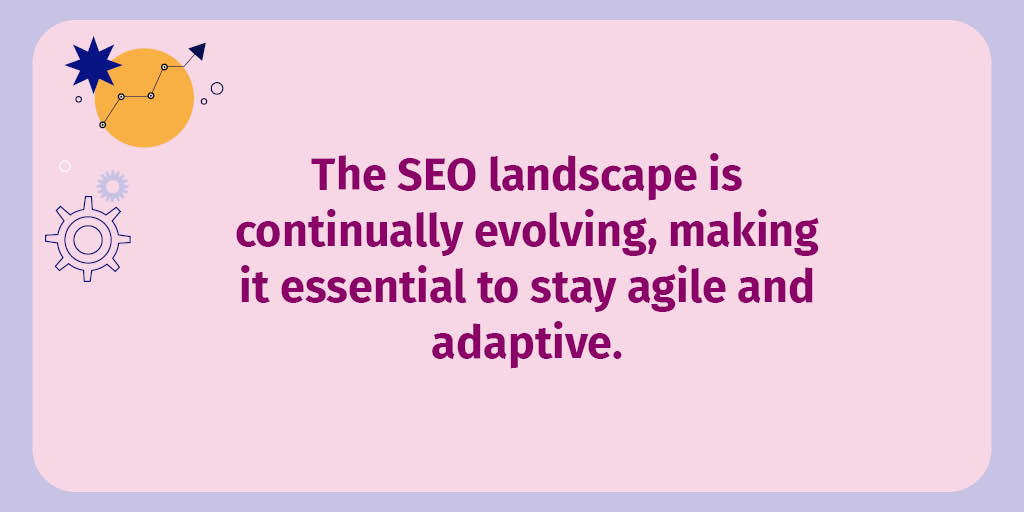
User Experience and Engagement
Search engines pay attention to how people interact with your website. If visitors quickly leave or can’t find what they need, it signals that your site isn’t providing value.
Make sure your website is easy to navigate, loads quickly, and provides clear paths for visitors to get more information or contact you. Good user experience leads to better search rankings and more conversions.
How Do You Create a Successful SEO Campaign?
A successful B2B SEO campaign requires careful planning, consistent execution, and ongoing optimization based on real data.
Developing Your Campaign Plan
Start by clearly defining what you want to achieve and how you’ll measure success. Your plan should include target keywords, content topics, and a timeline for implementation.
Research your competitors to see what’s working in your industry. Look for gaps in their content that you can fill or topics where you can provide better information.
Using Analytics to Measure Success
Set up Google Analytics and Google Search Console to track your progress. Monitor metrics like organic traffic, keyword rankings, lead generation, and conversion rates.
Don’t just look at traffic numbers. Focus on quality metrics like how long people stay on your site, which pages lead to contact form submissions, and which content generates the most qualified leads.
Making Data-Driven Improvements
Use your analytics data to continuously improve your SEO campaign. If certain types of content perform better, create more of that content. If some keywords aren’t bringing qualified traffic, adjust your strategy.
SEO is a long-term game, so be patient but stay active in making improvements based on what the data tells you.
Essential SEO Tools
Invest in good SEO tools to make your campaign more effective. Tools like SEMrush, Ahrefs, and Moz help you research keywords, track rankings, and analyze competitor strategies.
Google’s free tools, including Analytics, Search Console, and Keyword Planner, provide essential data for any SEO campaign. Start with these free options and add paid tools as your campaign grows.
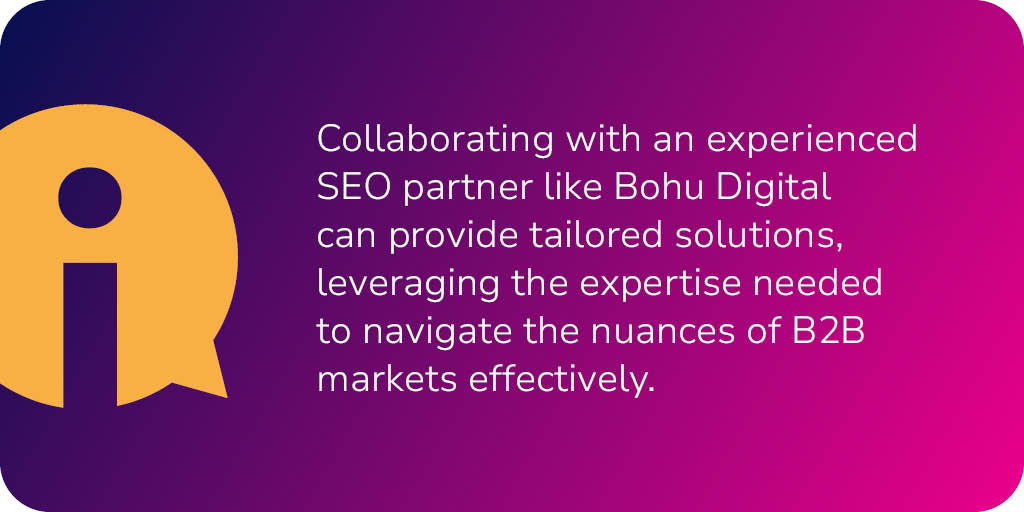
Is SEO Good for B2B Marketing?
SEO is one of the most effective marketing strategies for B2B companies because it helps you reach potential customers when they’re actively looking for solutions.
Benefits of B2B SEO
SEO generates high-quality leads because people who find you through search already have a business need. These warm leads convert better than cold outreach or generic advertising.
Unlike paid advertising, SEO results compound over time. Good content can continue bringing in leads for months or years after you publish it, making SEO very cost-effective long-term.
SEO also builds credibility. When your company consistently appears in search results for industry topics, potential customers see you as an expert and are more likely to trust you with their business.
Common B2B SEO Challenges
B2B SEO can be challenging because search volumes are often lower than in consumer markets. You’re targeting a smaller, more specific audience, which means fewer total searches.
The B2B buying process is also more complex, involving multiple decision-makers and longer sales cycles. Your SEO strategy needs to address different audiences and buying stages.
Competition can be intense for valuable B2B keywords, especially if you’re in a crowded market. You need to find creative ways to differentiate your content and target less competitive long-tail keywords.
Overcoming B2B SEO Challenges
Focus on quality over quantity. Even if search volumes are lower, the leads you generate through B2B SEO are often more valuable than high-volume consumer traffic.
Create comprehensive content that addresses the entire buying process. Instead of just targeting one keyword, build content clusters that cover related topics in depth.
Look for niche opportunities where you can become the go-to resource. Sometimes targeting very specific, lower-volume keywords can be more profitable than competing for popular terms.
Ready to Launch Your B2B SEO Campaign?
Creating a successful B2B SEO campaign takes time and expertise, but the results can transform your lead generation and establish your company as an industry leader.
Start by auditing your current website and content to identify opportunities for improvement. Research your target keywords and analyze what your competitors are doing well.
Develop a content strategy that addresses your customers’ real challenges and provides valuable solutions. Focus on creating high-quality, comprehensive content rather than trying to cover every possible topic.
Remember that B2B SEO is a marathon, not a sprint. Consistent effort over time produces the best results, so be patient and stay committed to your strategy.
Consider working with an experienced SEO agency if you don’t have internal expertise. The right partner can help you avoid common mistakes and accelerate your results while you focus on running your business. Trust Bohu Digital to transform your SEO efforts into a powerful growth engine, delivering assured success and a superior return on investment.














